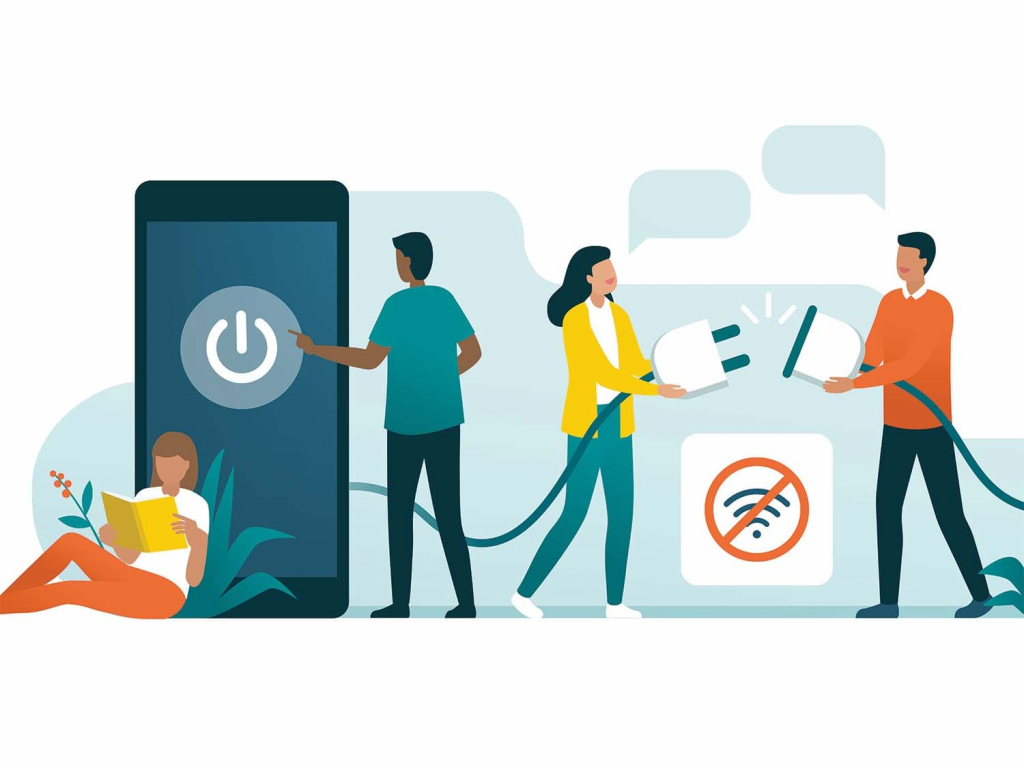Nowadays, even though we are constantly connected to the digital, we can still recognize that it has many negative sides. At the same time, it is always so difficult to just stop. Partly because of the fear of missing out, or a desperate need for an easy dopamine hit. People who manage to not look at their phones without those feelings are definitely a minority in the younger generations. The deliberate disconnection from the internet has therefore become a sort of luxury and even a trend to show superiority. However, is it truly superior to stop engaging with the modern information sources and take a step back? Is it possible or profitable to go offline when the world depends on the digital so much?

Many aspects of our lives take place in the digital world and are part of our routines. Whether it is utilized in working spaces, at schools and universities or simply for communication or entertainment purposes. In the past, when there was one computer in the whole household it was easier to divide the time and perception of what happens in reality and what is just an extension of it (in the digital). Now, with the development of technologies there are not only computers everywhere, but also extensions of the computers themselves – smartphones and the extensions of smartphones – smartwatches, and other devices that are overtaking and digitizing other spaces. Therefore, being fully offline is close to impossible, the constant engagement blurs the line between what we perceive as real or digital, and in turn the difference between necessity and addiction in terms of using technology.

Once we recognize the boundaries of diverse technology uses, we can try to eliminate the unnecessary ones. The digital detox can take many forms, for example time limits, deleting apps, making the access to them more difficult, getting rid of some devices or replacing them with older models to narrow down their functions to the most basic ones. The reason for this may be anxiety, burnout, wanting to earn back the control over our time or simply to experiment. There has recently been a trend of young people buying flip-phones to keep up with the 2000s aesthetic wave. It is not only about being ‘cool’ but actually it shows that even young people are perfectly aware of the fatigue that the digital world imprints on its users. This brings us to this interesting paradox of disconnection, because how would I know that those teenage girls have switched to flip-phones if they didn’t share it online with their smartphone…

With this example, we can see how everything is shared and dependent on the online. The digital both covers those social aspects but also facilitates our lives through functions like online banking, online register, remote job application and other services. The disconnection could be considered self-sabotage in these terms, because it extends beyond personal life and becomes a part of the system in which many components rely on the digital.

To sum up, the disconnection paradox helps us to notice the difference between practical and emotional dependence on the media and technology. While people seek a simple solution to quit their social media based entertainment addiction, complete disconnection might not be the right solution as the technology also serves a practical function. It is so difficult to deal with the habit of doomscrolling because people would have to be more mindful and strict on themselves to control it, since complete laying off is not realistic. Therefore, the goal should be to consciously live within the digital world and not to escape it.
Bachground reading
Zhang, Y., Shang, S., Tian, L. et al. The association between fear of missing out and mobile phone addiction: a meta-analysis. BMC Psychol 11, 338 (2023). https://doi.org/10.1186/s40359-023-01376-z
New York Post. 2025. “Flip Phone Summer: Gen Z Vows to Resurrect Low-Tech.” New York Post, July 22.



This is a very interesting perspective. I have also reflected on the topic of disconnection in my blogs before, but I have never thought about the practical dependence on the digital, which is definitely way harder to deal with compared to the emotional addiction. It is a very interesting point of view to introduce when discussing how we spend time online and how we can disconnect more often.
Your post made me think about how impossible it feels to fully disconnect these days. The flip-phone example is perfect!
This thing is like a Catch-22: the only way we even know someone is “offline” is because the digital medium they’re absent on tell you so. It’s wild how the digital both enables and exposes our attempts to unplug, and makes you wonder if true disconnection is even possible anymore… or if we’re all just playing a very public game of digital hide-and-seek.